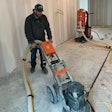

Oh, oh, here it comes — the flushed face,the rapid breathing, the clenched teeth. Your customer just saw his new hardwood floor and it doesn't meet his expectations. Now he's coming after you.
Do you remember the Perato Principle. You know, the one that tells you 80 percent of your business comes from 20 percent of your customers. That's true for some businesses. What's true for all businesses is the Perato Principle of Tough Customers: 80 percent of your walking, talking, complaining headaches come from 20 percent of your customers.
There is bad news and good news enshrined in this axiom. The bad news is you must deal effectively with that tough 20 percent if you don't want to jeopardize your bottom line. If you are not skillful with these titans, they'll put their well exercised vocal chords to work bad mouthing you throughout the community. You will lose their future patronage which, while your blood is boiling, might appear as a blessing. The problem is, they take a big bite out of your business as they tell torrid tales of how badly you treated them.
The good news is that since the number of tough customers is small, you can learn tried and true ways to keep their business, their friends' business, and your sanity at the same time. In this article, top experts from all over the country tell you what works, and what doesn't, when you're talking to that tough customer.
Five Intelligent Steps
Dan Goleman, author of Emotional Intelligence,offers five steps to tackle the tough customer. Goleman's message is that people who handle situations with "emotional" intelligence are a lot smarter than their colleagues with much higher IQs. They are more successful. And unlike IQ, you can increase your emotional intelligence through practice.
Goleman defines emotional intelligence as"knowing and managing one's emotions,empathizing with others,and handling relationships effectively." In a nutshell, Goleman describes his five step plan for tackling the tough customer this way:
1) Get hold of your own emotions. "If you let their attitude upset you, you can't deal calmly and clearly with them. Stop. Take a few deep breaths. Count to 100 — whatever works for you."
2) Tune into them and really listen. "Really listen to what he or she is saying. Don't bethinking to yourself, 'This person is abusive,complaining, indecisive and overly finicky.' Go beyond that and try to figure out why the tough customer has become abusive, complaining,indecisive and overly finicky. People don't start out that way," Goleman says, "they become that way. Try to understand their perspective."
3) Even if you have the solution, wait. "Don't jump in too quickly. Encourage them to talk. You do this by asking them questions in a sympathetic tone of voice. For example, say, 'Tell me what happened to you.' Try to picture their situation. Try to see it from their perspective. Try to figure out why it seems like the fault is yours. Ask clarifying questions. Keep asking until you fully understand the situation." Goleman adds, "Some people call this 'letting them vent.' I call it 'really listening.'"
4) Sympathize with the tough customer. "Say something like, 'Gosh,no wonder you're upset,'" Goleman suggests. "You can even put yourself in their shoes and say, 'I'd be upset too if that happened to me.'
"Michael Browning, head of Browning Brothers Flooring in Mobile, Ala.,believes that immediately defusing the anger of irate customers is the foremost step in dealing with this type of situation. "What I try to do is disarm them on all the issues they're bringing to me, and just address it, 'You're right,if they did this or we did this, you're right,' " Browning says. "And once they get that out of their system, then we start addressing the issues one at a time. But if I can disarm them and get all the wind out of their sails, then they seem to calm down a whole lot more."
5) Finally, see if you can solve their problem. "Maybe you can solve the problem, and maybe you can't. If you can, great. If you can't, be apologetic and sympathetic about that," Goleman says. "Often all people want is to be heard,understood, and sympathized with. That's why they're acting so tough."
Browning adds that he always goes ahead and takes care of the problem unless it is something that would cost him a large amount of money. In that case, he tries to negotiate with the customer to arrive at a fair resolution to the problem.
Specific problems that Browning sees arise are customers thinking that there is not enough gloss on the flooring, an instance in which some trash shows up in the finish, or if his crews stay a day or two longer than they said they would. "Or if there's a board that may have a small defect in it, and they just look at that board, and they look at it and they look at it, and it just becomes an eyesore to them," Browning adds. "Go ahead and take that board out; fix it and be done with it. And they're happy. Our biggest advertising is word-of-mouth."
Role-Play
Now, what if you're absent when the migraine comes charging through your business's door. Are your employees prepared. Jeff Slutsky, president of Street Fighter Marketing in Columbus,Ohio, believes strongly in role-play. No matter how much we talk about the possibility of an insufferable customer yelling or swearing, when the first real one lets out a string of cuss words that would sizzle bacon, unprepared employees run for cover or make amateur attempts to fight back.
Just as soldiers in the armed forces go through maneuvers and "war games,"Slutsky suggests, managers should go through "war games" with their employees. He advises them to have a"Tough Customer Boot Camp" with every employee who might meet the monster. Slutsky, a marketing trainer, says that the most effective learning is a series of one-hour sessions. He says,"Have your employees practice staying cool and calm while another employee plays the role of the tough customer. Tell that employee that it's 'no holds barred.' Tell him to pretend to be the toughest customer he himself ever came up against. Let him scream and yell to his heart's content.
"Beyond the game being excellent preparation for staying calm in the red face of a mad customer, the game is fun and creates a solidarity among the employees." Slutsky adds, "If you repeat the training enough, your employees are less likely to get caught off their emotional guard when the real tough customer attacks them."
Help Customers Complain
Shirley Bednarz, a principal of Bednarz Business Strategies, a sales training and consulting firm in Stevens Point, Wis.,offers an additional technique for tackling the tough customer. She believes strongly in the old adage: An ounce of prevention is worth a pound of cure. Bednarz advises, "Make it easier for your customers to complain before they get exasperated and wind up yelling." She offers three ways to do this:
1. If you mail out invoices, or when you give customers their bill of sale,include a card or questionnaire that they can use to identify areas they feel need attention. When you read their comments, you may be surprised. Often you will find ways to easily modify your policies to better meet your customers' needs.
2. Call your customers personally to follow up on big jobs. When you invite customers to discuss their little concerns now, it can head off big complaints later.
3. Finally, she says, don't let a tough customer leave or hang up before asking, "Have we solved your problem or concern to your satisfaction." The closure of a customer complaint is just as important as solving the problem. It creates customer loyalty and encourages positive word of mouth.
Darrell Rogers, who runs SCS Hardwood Floors in Orlando, Fla.,believes that education is the key to minimizing problems with customers. "Forewarn them that there could be an issue," he says. "That's the biggest thing. If there is a problem, let them know you're there to take care of it, and don't let it drag out." Specifically, he tries to explain to customers the differences between engineered hardwood floors with a factory finish and sand-and-finish hardwood floors.
"I'll warranty a floor as long as that home owner is in a house," Rogers says. "I cannot warranty a finish. Your engineered products come with a factory warranty. I can't control the traffic, so educating the consumer on how to maintain the floor is the biggest thing."
Know Your Regulars
Frank Grazian, a communications professor emeritus at Rowan College,agrees that actions taken before the customer becomes angry are the best way to reduce the numbers of tough customers you have to deal with. His unique suggestion involves your regulars. Just as the waitress at the coffee shop knows to always give Sam ketchup with his scrambled eggs, and Bill extra butter with his flapjacks, learn the specific tastes of your regular customers. In fact, he adds, "familiarize your staff with what to expect from these regulars. That way, your regular customer feels like a VIP and is a lot less apt to become one of the tough 20percent."
Charles Dixon, owner of Hardwood Floors by Charles in Farmington Hills, Mich., says he deals with the issue of problem customers by trying not to have them in the first place. "When I go to somebody's house for a look at their job and whatever, I kind of assess the person," Dixon says. "And I'll be blunt, if I smell idiot, I'm out of there."
However, Dixon acknowledges that occasionally getting involved with somebody who is a problem customer is unavoidable. "And I'm not talking about them being dissatisfied with my work or the product or something –- that's a me problem," he says. "I'm talking about someone who is not a reasonable person and who wants to just push the issue. All I can say is that you have to be patient with these people, you have to listen to them and make them feel that you're understanding them. You just have to take these extra steps, basically put up with this person, and do everything you can to make them happy."
Grazian is also a big advocate of training. "If your local college or any local company has seminars on dealing with difficult people, send your employees. Companies like Career Track, Fred Pryor, and National Seminars have sessions that come to most large cities in the United States. (See the sidebar page 93, "Seminars on Serving Customers.")
"Training your employees is a wise investment. The problem of finding and retaining qualified personnel is becoming greater and greater. You want to make sure you keep the ones that you have. Good employees appreciate the opportunity to gain new skills that they can use in their professional and personal life."
Work With Employees
One of the toughest challenges a business owner or manager has is keeping silent while an employee totally botches a situation with a tough customer. The temptation is to jump in, brush the employee aside, and takeover. Unless this is done with great skill, the employee feels belittled.
Sam Deep, co-author of What to Say to Get What You Want, warns, "Once you criticize that employee and hurt his or her self esteem, logic goes out the window. Then you really have a problem on your hands." Deep, who designs employee development plans for major companies, says how you handle your employees and their treatment of tough customers is crucial. "If one of your employees has dealt unskillfully with a tough customer," he cautions, "do not criticize the employee. Simply resolve to give that particular worker some coaching on handling tough customers. If, during that coaching session, you feel you must refer to the incident, make sure you are not critical of the employee, merely the action he or she chose."
Apologies Can Work
When a problem is really not their company's fault, managers naturally ask, "Why should I apologize." Kelly J. Watkins, president of communications training firm Expressive Concepts in Louisville, Ky. says: "Apologizing doesn't have to mean that you have done anything wrong. It can merely be a way of saying, 'We are sorry that you,our customer, had a problem.' When you understand the difference, it's easier to be genuine when you express concern."
Watkins adds, "You may even want to thank the customer for bringing the problem to your attention." Most unhappy customers simply suffer silently. But they no longer give you their business. Whereas this talkative tough customer has just given you the opportunity to resolve the trouble. That's worth a thank you.
Besides the apology quandary,another perplexing problem for business managers is whether to agree with the facts that the tough customer presents or set the record straight. "You should start by acknowledging their perspective," says Watkins. "That means putting yourself in your customer's shoes and perhaps saying,'I see how you might feel that way,' or the ever welcome, 'I understand.'Neither statement implies agreement or that you have done anything wrong."
Dixon says that many people nowadays go on the Internet and think that they've educated themselves about hardwood flooring issues. As a result,some customers think they're going to tell the contractors what they need;often these people are not right and do not have reasonable expectations,Dixon says.
"It's up to me to make them aware and make sure they have reasonable expectations about the product and what they're doing," Dixon said. "And if I don't do that, then it's my problem. But as far as that goes, know your product and know what you will and won't work with. And know what's going to cause you a problem and what won't."
When it comes time to solve the problem, Watkins advises, try to find creative resolutions. One of the most effective is to let the customer choose between two alternatives. "That way,she adds, "the customer feels he or she has gotten their way. Often that's all a tough customer wants."
Rogers says that he tries to take care of problems as soon as possible –definitely within 48 hours, because if you let the problem sit and simmer,customers often will find more issues of contention, he says.
As in a family, arguments with a tough customer are sometimes not so much about the facts of what happened. They're just about winning. Dr. Joyce Brothers, the world-renowned psychologist, has an insightful, colorful and refreshingly female point of view. Dr. Brothers paints a vivid picture of a typical argument between vendor and tough customer. She says, "If you're in a tug of war with a customer, and you simply let go of your end of the rope,you don't have a tug of war anymore. All you have is someone with a lot of rope curled around them."
The war is over.
































